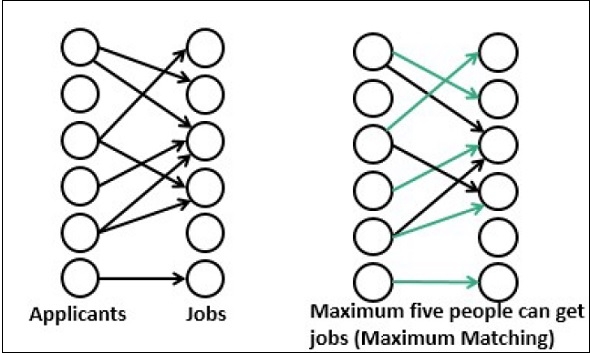
 Data Structure
Data Structure Networking
Networking RDBMS
RDBMS Operating System
Operating System Java
Java MS Excel
MS Excel iOS
iOS HTML
HTML CSS
CSS Android
Android Python
Python C Programming
C Programming C++
C++ C#
C# MongoDB
MongoDB MySQL
MySQL Javascript
Javascript PHP
PHP
- Selected Reading
- UPSC IAS Exams Notes
- Developer's Best Practices
- Questions and Answers
- Effective Resume Writing
- HR Interview Questions
- Computer Glossary
- Who is Who
Maximum Bipartite Matching
The bipartite matching is a set of edges in a graph is chosen in such a way, that no two edges in that set will share an endpoint. The maximum matching is matching the maximum number of edges.

When the maximum match is found, we cannot add another edge. If one edge is added to the maximum matched graph, it is no longer a matching. For a bipartite graph, there can be more than one maximum matching is possible.
Input and Output
Input: The adjacency matrix. 0 1 1 0 0 0 1 0 0 1 0 0 0 0 1 0 0 0 0 0 1 1 0 0 0 0 0 0 0 0 0 0 0 0 0 1 Output: Maximum number of applicants matching for job: 5
Algorithm
bipartiteMatch(u, visited, assign)
Input: Starting node, visited list to keep track, assign the list to assign node with another node.
Output − Returns true when a matching for vertex u is possible.
Begin for all vertex v, which are adjacent with u, do if v is not visited, then mark v as visited if v is not assigned, or bipartiteMatch(assign[v], visited, assign) is true, then assign[v] := u return true done return false End
maxMatch(graph)
Input − The given graph.
Output − The maximum number of the match.
Begin initially no vertex is assigned count := 0 for all applicant u in M, do make all node as unvisited if bipartiteMatch(u, visited, assign), then increase count by 1 done End
Example
#include <iostream>
#define M 6
#define N 6
using namespace std;
bool bipartiteGraph[M][N] = { //A graph with M applicant and N jobs
{0, 1, 1, 0, 0, 0},
{1, 0, 0, 1, 0, 0},
{0, 0, 1, 0, 0, 0},
{0, 0, 1, 1, 0, 0},
{0, 0, 0, 0, 0, 0},
{0, 0, 0, 0, 0, 1}
};
bool bipartiteMatch(int u, bool visited[], int assign[]) {
for (int v = 0; v < N; v++) { //for all jobs 0 to N-1
if (bipartiteGraph[u][v] && !visited[v]) { //when job v is not visited and u is interested
visited[v] = true; //mark as job v is visited
//when v is not assigned or previously assigned
if (assign[v] < 0 || bipartiteMatch(assign[v], visited, assign)) {
assign[v] = u; //assign job v to applicant u
return true;
}
}
}
return false;
}
int maxMatch() {
int assign[N]; //an array to track which job is assigned to which applicant
for(int i = 0; i<N; i++)
assign[i] = -1; //initially set all jobs are available
int jobCount = 0;
for (int u = 0; u < M; u++) { //for all applicants
bool visited[N];
for(int i = 0; i<N; i++)
visited[i] = false; //initially no jobs are visited
if (bipartiteMatch(u, visited, assign)) //when u get a job
jobCount++;
}
return jobCount;
}
int main() {
cout << "Maximum number of applicants matching for job: " << maxMatch();
}
Output
Maximum number of applicants matching for job: 5

Advertisements
